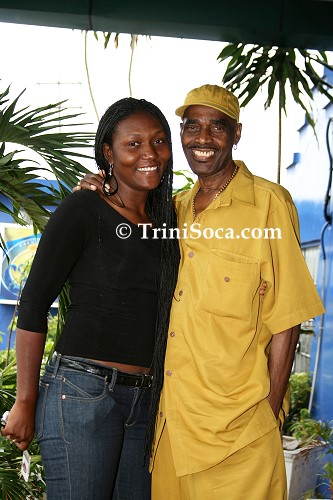|
|
The Mighty Duke Speaks
TriniSoca.com Reporters
Recorded: on September 27, 2007
Posted: October 03, 2007
Duke's Homepage | 01 | 02 | 03 | 04 | 05 | 06 | Next >
 | | Kelvin 'Mighty Duke' Pope and his wife Rebecca
| |
Kelvin Pope, known in the Calypso world as 'Mighty Duke', is a legendary Calypsonian whose work spans a period of over fifty years. Born in 1932 in Point Fortin, south Trinidad, 'Duke' grew up in a period that was marked by striking workers who challenged the colonial authorities by protesting against working conditions, wages, racism and exploitation in the oilfields. Growing up in this turbulent period would have a lasting impact on Kelvin Pope and the music that he would create in years to come. His serious Calypsos reflect a spirit of resistance that is still very much alive up to this day. Influenced by Calypso stalwarts like 'Lord Syncopator', 'Mighty Spoiler', 'Mighty Cypher' and 'Lord Kitchener', 'Duke' has, over the years, become renowned not only for delivering social commentary, political and witty, humorous songs with equal skill, dignity and lyrical mastery but also for his stately stage presence and for being one of the best-dressed Calypsonians to this day. The only Calypsonian to win the National Calypso Monarch Crown four times in a row, Kelvin Pope's body of work includes "Black is Beautiful", "Teach the Children", "Brotherhood of Man", "Mathematical Formula", "Treat Your Woman", "Land Of Love" and "Pan In Yuh Ruckungkertungkung". His focus has not been limited to local issues as he has demonstrated the importance of a global awareness in his interest in the liberation struggles in Africa. With such songs as "How Many More Must Die" and "Apartheid" he was a vocal critic of apartheid in South Africa.
On Thursday 27th September, 2007, Kelvin 'Mighty Duke' Pope shared some of his perspectives and life experiences with TriniSoca.com.
TRINISOCA.COM: We would like to begin with your early days. Could you tell us where you born and where you grew up?
DUKE: I was born in New Lance Point Fortin and I grew up as an ordinary kid during that time in Point Fortin. In those days, Point [Fortin] wasn't as developed as it is now. New Lance was more like the town. It was the central part of Point Fortin at that time.
TRINISOCA.COM: In terms of your childhood, were you interested in Calypso, song writing, and music?
DUKE: You know as a child you are not interested in anything in particular except play, like sports in school and so on. As a child I grew up hearing Calypsos by the old bards from being around my parents who always played Calypso records because they loved Calypso music.
TRINISOCA.COM: Who are some of the early Calypsonians your parents would have listened to?
DUKE: Calypsonians like 'Mighty Growler', 'Roaring Lion', 'Mighty Tiger', 'Ziegfield' - the old great ones. In those days they played records.
TRINISOCA.COM: At what point did you actually get interested in singing Calypso?
DUKE: I would have been about seventeen years old at that time. Hearing the old great ones as a child contributed to me being pretty good in poetry, essays and compositions. The interest in singing Calypso sort of grew in me.
TRINISOCA.COM: What topics grabbed your attention at that age?
DUKE: No special topics. In those days I wasn't thinking about any particular topics. I used to love listening to 'Spoiler' because he was very humorous. I loved 'Mighty Spoiler' and 'Mighty Cypher'. I wasn't particularly interested in things like the Road March and what you used to call 'break away' at that time. I was more interested in the serious songs like "Love, love, love alone that making Edward leave he throne". I was interested in those well-constructed Calypsos, humour and so on. I guess that was the direction I took.
TRINISOCA.COM: What was happening in the society at that point in time?
DUKE: Ohh! A whole lot of things were happening at that time. I grew up in an era when Steelband was just coming into being and they were just making the one note or the three notes on the Pan. That was when J'Ouvert was still J'Ouvert. Back then, when you see a J'Ouvert morning band it was like a forest coming down the street. It was only branches; and yuh hearing tamboo bamboo mixed with biscuit drums and so on. That was the era I grew up in.
Musically, Steelband was just coming into being. Politically, that was the era of Butler. That was in Butler's time and he was in Point Fortin. Butler was mostly based in Fyzabad and Point Fortin. Most of the people (the Butlerites) were in Point Fortin and they used to have their meetings and so on. I remember as a child my parents would take me with them to the meetings. I grew up in that era of resistance.
TRINISOCA.COM: Things like the Steelpan and Calypso in the past have been mostly associated with Port of Spain. What did you experience in South in terms of those art forms?
DUKE: Well, hearing people speak about what was happening in town now was the same thing that was happening in Point at that time. I hear them talking in Port of Spain and saying that they were just tuning Pan and they got into the three notes and so on. That is exactly what was happening in Point at the time. I don't know if those from Port of Spain came down to Point with what they had. There were people who were trying to get notes out of Pans and so on in Point Fortin at that time. The same evolution that was taking place in Port of Spain was taking place in South.
Continue...
Duke's Homepage | 01 | 02 | 03 | 04 | 05 | 06 | Next >
|

|